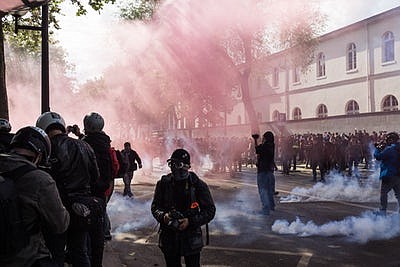Across the Atlantic, tempers spilled onto the Paris streets. The carbon tax, implemented to help curb climate change, resulted in thousands of demonstrators marching from the outer provinces to the nation’s capital for the past few weeks to protest the policies of President Emmanuel Macron. The former investment banker has been accused of being out of touch and a “president for the rich.”
The growing disapproval of Macron coupled with the policies he has passed during his first year in office has consequently sparked a bitter rage, which escalated to violence. A crowd wearing neon yellow jackets, referring to themselves as gilets jaunes, vandalized the Arc de Triomphe, one of France’s famous monuments as a show of outrage. Many more barged down the streets chanting and jeering, all while law enforcement used tear gas and water cannons to disperse the crowd.
After nearly a month of protests, Macron did his best to quell the anger with a formal televised announcement in which he communicated that the fuel tax would be eradicated. In addition, he promised to increase the salary to one hundred euros a month for minimum wage workers and cancel the social security tax at the beginning of next year. Despite all these promises, the protests persisted. The Yellow Vest movement became more than just an angry battle cry denouncing the fuel tax, but also an opportunity to express the frustration concerning low wages, unemployment and widening inequality.
The rise of the Yellow Vest movement has come to represent the dwindling middle class and working class who feel shut out and ignored. The lack of social and economic mobility has left many to question the future. The French are no stranger to revolts but such an alarming and vitriolic response could be viewed as completely unexpected, or just an inevitable reaction to feeling unheard by a president who championed social reform, as well as a snail-like pace to change.
Much of what has occurred in France over the past few weeks mirrors a number of political issues that have plagued American citizens since the 2008 financial crisis. Unemployment, stagnant wages, high costs for health insurance and crippling student loan debt are all economic barriers that have led to a subpar standard of living. A study led by Stanford University professor, Rej Chetty, revealed that millennials will be the generation that won’t earn more than their parents, but yet there hasn’t been a movement addressing the financial strain many young adults experience.
Could and should Americans protest the subpar social and financial institutions that have been a part of our DNA for so long that we fail to question them? Have we become complacent? Have we adopted a self-defeatist attitude where we reluctantly accept the inequalities that hinder our path to living fulfilling lives?
Many would say that violence isn’t the answer; Some would say violence is an acceptable form of rage without direction that submits— without thought— to the most primal aspects of our being. Maybe violence is the last resort for those living on the fringes of societyin dire circumstances who have felt silenced and shut out for so long that there isn’t much left to do but scream.
What can be gained from this level of free-flowing rage?
Within the past year, protests to reform gun control laws, protests against the U.S. National Anthem, the MeToo movement and marches for better treatment of illegal immigrants have dominated the media. Although any kind of organization against the injustices of society is necessary, one can argue that it has become much easier to address identity issues and issues that pose an immediate physical threat as opposed to demanding the government change policies that surely control one’s choice between having a successful career versus working at a minimum wage job.
In a time where a white picket fence, an evenly cut lawn and a picture-perfect family have become difficult to achieve and afford, as well as a stable job spanning decades is rare to come by, when will our anger and resentment spill onto the streets?
The power behind the Yellow Vest movement lies in the people, and perhaps Americans may follow their example. No person should have to accept policies that work against their own livelihood or face the hindrances preventing the natural progression of achieving life milestones. Anger and rage should re-surface when basic necessities are too expensive to afford, whether it be fuel, affordable healthcare costs or the pursuit of higher education.
Sometimes, debilitating fury is all that is left, and it may only be a matter of time before Americans finally realize that they can demand more.
Morgan Reid completed her under-graduate degree at Temple University. She holds a masters from Johns Hopkins University and lives in Baltimore, MD.
